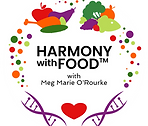Embrace Eggs: New Cholesterol Recommendations
- Meg ORourke, RD-LDN
- Feb 1, 2018
- 2 min read
Updated: Sep 26, 2020

Last month, the Washington Post broke the news that the Dietary Guidelines Advisory Committee planned to propose a BIG change to the 2015 edition of Dietary Guidelines for Americans—the publication, updated every five years, outlines a healthy diet. And they did: The group’s recently released report recommends the complete removal of limitations on dietary cholesterol, stating that it’s “not a nutrient of concern for overconsumption.” Until now, the guidelines have advised consuming no more than 300 mg/day. I agree with the panel’s recommendation and applaud them for reversing their long-held stance.
As I’ve written before, eggs were once vilified for their cholesterol content, while today they’re recognized as a powerful source of nutrients without a clear connection to heart disease. This scientific shift has been happening for quite some time, and current evidence shows no discernible relationship between dietary cholesterol and cholesterol levels in the blood. In fact, only an extremely small percentage of people experience any rise in blood cholesterol after eating cholesterol-rich foods like egg yolks, shrimp, and other animal products.
But that doesn’t mean you should go out and indulge in all the cheeseburgers you want. While dietary cholesterol doesn’t increase serum cholesterol levels, and thus your risk for developing cardiovascular disease, saturated fat does. Rightly, the same advisory committee concluded that Americans eat way too much saturated fat. I stand by the American Heart Association’s advice to limit the amount of saturated fat you eat to less than seven percent of your total daily calories. That means if you need about 2,000 calories a day, less than 140 calories or 16 grams should come from saturated fats.

How can you ensure you don’t go over your saturated-fat budget? Choose foods rich in heart-healthy monounsaturated and polyunsaturated fats like fish, nuts, and vegetable oils. Purchase lean cuts of meats, and select breads and baked
goods that are low in saturated fat (read your nutrition labels!). Opt for low-fat cheeses and dairy products (non-fat cheeses tend to taste rubbery, leaving us unsatisfied and ready to graze)—as a
general rule, look for cheeses

with no more than six grams of fat per serving/slice; in my fridge are brands like Babybel, Alpine Lace, and The Laughing Cow. And go ahead and enjoy eggs (up to seven
per week). I love these Mediterranean Breakfast Sandwiches for any meal of the day: They’ve got spinach to help you eat your veggies, they’re packed with protein and fiber to fill you up, and they’re big on flavor thanks to fresh herbs.

Note: The advisory committee doesn’t write or issue the official dietary guidelines. They submit their report and suggestions to the Department of Health and Human Services and the Department of Agriculture, which will jointly
publish the 2015 guidelines later
this year. While these agencies usually adhere very closely to the panel’s recommendations, we’ll have to wait to know for sure if cholesterol limitations will be removed. This dietitian has got her fingers crossed.
Images courtesy of Feelart, tiverylucky, amenic181, Suat Eman / FreeDigitalPhotos.net. Photo of me taken at the ribbon cutting ceremony for Hope & Main, Rhode Island's first kitchen incubator, of which I'm a BIG supporter. Learn more at makefoodyourbusiness.org.





.png)























Comments